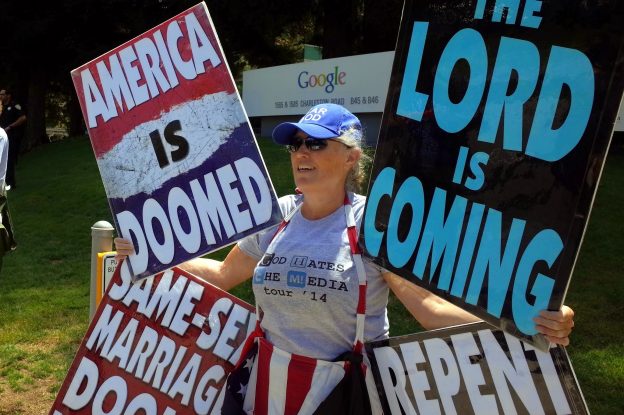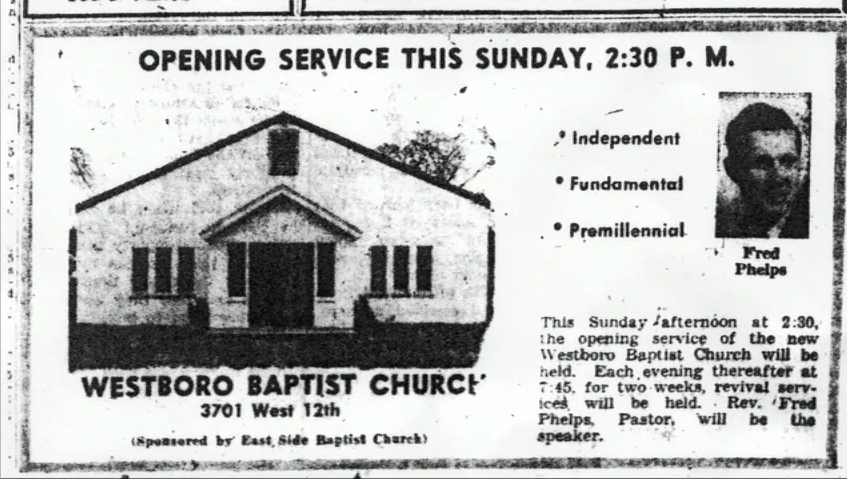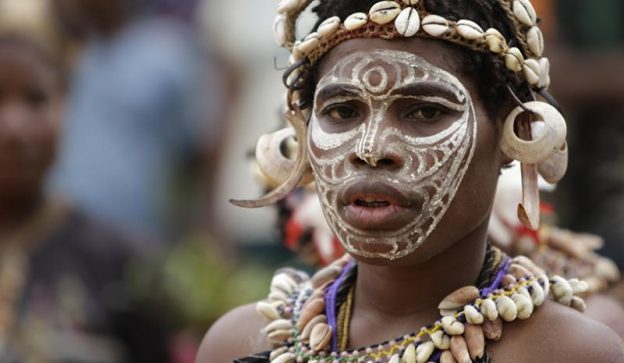Louis Theroux, the journalist and documentary filmmaker, has never shied away from controversial topics, communities, and individuals. His 2007 documentary, The Most Hated Family in America, which documented the activities of the Westboro Baptist Church (WBC), served as an especially notable example. Following its success, Theroux recently returned to the WBC for a follow-up documentary, Surviving America’s Most Hated Family, which aimed to give an insight to the current climate of the church, particularly following the recent death of its founder, Fred Phelps.
The WBC is commonly associated with the Phelps family, who are at the centre of the church’s practices, activities, and public engagement. While there are other members beyond the Phelps family, the WBC consists of fewer than 100 members, and largely stands apart from other forms of Baptist denominations. The Phelps and other WBC members have become known as a hate-group in public discourse, particularly due to their use of highly discriminatory language and actions directed towards groups including the LGBTQ+ community, Jews, Muslims, and the American military. The WBC have become renowned for their public protests, during which they hold inflammatory signs (including ‘GOD HATES FAGS’, ‘YOU’RE GOING TO HELL’, and ‘ABORTION IS BLOODY MURDER’), which have drawn significant attention from the media (ranging from news coverage to comedic parodies).
During his original documentary Theroux spent a significant amount of time meeting Fred Phelps and his daughter, Shirley Phelps-Roper, and concentrated on the homophobic beliefs and actions of the WBC. For his return in Surviving America’s Most Hated Family, Theroux stated that “embarrassing secrets were said to be coming out” about the WBC, specifically concerning the issue of apostasy and the excommunication of Fred Phelps prior to his death.
These issues were the thrust of Theroux’s documentary. On the surface, very little has changed, as demonstrated by a WBC picketer’s “GOD STILL HATES FAGS” sign (“God hasn’t changed, and he’s not going to”, he explained). Religions, however, particularly New Religious Movements, are dynamic categories. They are in a constant state of change depending on its members, social environment, and practices. Theroux was successfully able to probe the issue of apostasy – three of Shirley Phelps-Roper’s children (two daughters and one son), have recently left the WBC, and have been subject to ‘shunning’ from their family and the church. Notably, Megan Phelps-Roper discussed how she decided to leave the church following conversations with outsiders on Twitter, and has since presented a TED talk on her experiences of the WBC and why she left.
Arguably the most interesting aspect of the documentary is the second “embarrassing secret”: the shunning of Fred Phelps. Before his death in 2014, it is alleged that Phelps approached the residents of the ‘Equality House’ (a house near the WBC painted in Pride colours as a form of protest), and told them that they were “good people.” Given Phelps’ reputation for highly homophobic sermons, such an action seems at odds to the discriminatory activities with which the WBC are typically associated. It is believed that, as a response, WBC members voted to excommunicate Phelps from the church. Perhaps unsurprisingly, Theroux was less successful in gaining substantial information on this issue. Beyond the accounts of Shirley Phelps-Roper’s apostate children, WBC members were not forthcoming with details, and mostly avoided his questioning on the topic.
The excommunication of a leader is highly significant, particularly one that directly informed the core beliefs and practices of their community. Scholars of new religions have committed a significant amount of research on the notion of ‘charismatic leaders’, those who attract devotion and dedication from their followers (see Barker 1992). The death of a charismatic leader raises several possibilities for the future (and survival) of a movement. For the WBC, this issue has an even greater impact due to Phelps’ “loss of charisma” (Wessinger 2012). As Theroux correctly observed, any acknowledgement of his excommunication from the WBC would suggest a fallacy, or that Phelps had “fallen” by straying from the core message of the church.The Weberian (1948) model of routinized charisma suggests that a movement succumbs to routine bureaucratic authority following the death of the charismatic leader. However, due to Phelps’ excommunication, it is currently unclear how his charismatic authority may or may not be preserved. His loss of charisma is already making its mark on how the WBC is organized – Theroux suggests that Shirley Phelps-Roper has been “sidelined” (having previously acted as the WBC’s chief spokesperson). Furthermore, whilst the Phelps family continue to be at the core of the WBC membership, there are a small number of new members joining the church, which seem likely to influence the future direction of the WBC.
As previously noted, the day-to-day activities of the WBC are largely unchanged, with its members continuing to pursue their controversial picketing. Yet the excommunication and death of Phelps is resulting in significant organizational changes ‘behind the scenes.’ Theroux’s latest documentary offers us a glimpse of this transition, but the full impact of the WBC’s rejection of Phelps remains to be seen.
References
Barker, E. (1992) New Religious Movements: A Practical Introduction, London, HMSO.
Weber, M. (1948b) ‘The Social Psychology of the World Religions’, in Gerth, H. H. and Mills, C. W. (eds and trans), From Max Weber: Essays in Sociology, London, Routledge, pp. 267-301 (this edition 1991).
Wessinger, C. (2012) ‘Charismatic Leaders in New Religions’, in Hammer, O. & Rothstein, M. (eds), The Cambridge Companion to New Religious Movements, Cambridge, Cambridge University Press, pp. 80-96.



